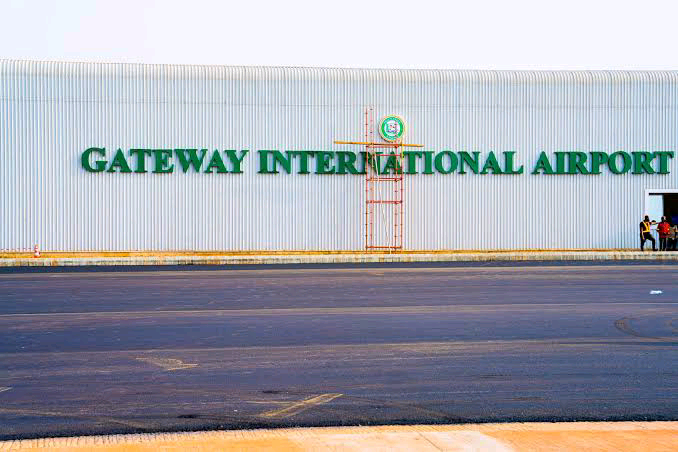News
Abuja-Kano Road, 2nd Niger bridge, part of Buhari’s legacies – Group
Cleen Foundation, a Non-Governmental Organisation (NGO) says the reconstruction of Abuja-Kano Road and the actualisation of the 2nd Niger Bridge are part of the President Muhammadu Buhari’s legacies.
Executive Director, Mr Gad Peter of the foundation said this on Wednesday in Abuja at the Civil Society Organisations (CSOs) Roundtable dialogue on Asset Recovery in Nigeria, organised by the foundation.
Peter said that in February 2021, the foundation was appointed by the Federal Government and the U.S Government as an independent CSO to effectively monitor the implementation of the tripartite agreements.
He said that the monitoring was on the sharing, transfer, disposition, repatriation, management and utilisation of the forfeited assets being used for the various infrastructure development project in Nigeria.
“We appreciate the FG, the UK, the U.S. governments and the Ministry of Justice for the partnership and opportunity that enables us to keep a close eye on the full utilisation of the Abacha loot.
“The initial results of this monitoring exercise are promising and there is certainly room for improvements in the project implementation and the monitoring and these legacy projects would successfully reach their completion stages,” he said.
Adviser to the Office of the Attorney-General of the Federation on International Assets Recovery, Juliet Ibekaku-Nwagwu said that the International assets recovered were highly beneficial to Nigeria and its people.
Ibekaku-Nwagwu said that the assets recovered since 2017 from the U.S, Switzerland, Balbwick of Jersey, Northern Ireland, had aided significant infrastructure developments which, when translated, would boost the nations productivity.
“When efforts are made to access this assets, there is always agreements to ensure that the assets are beneficial to Nigerians and as such every recovered assets is invested in developmental projects.
“Since we started the assets recovery in 2017, the Federal Government of Nigeria has signed agreements with Jurisdiction Agencies involved to monitor the usuage of every asset.
“Agreements were signed in the assets recovery from Switzerland, World Bank and the Federal Republic of Nigeria in Dec 2017, also from the United States, Baldwick of Jersey and the Federal Republic of Nigeria in February 2020.
“There are tripartite agreements between jurisdiction agencies such as Switzerland, Ministry of Foreign Affairs, World Bank, Ministry of Justice, Social Investment Offices, and the Federal Ministry of Humanitarian Affairs and Disaster Managements,” she said.
She added, “In the Mohammed Sani Abacha assets recovery and the Northern Ireland in Aug. 2020, there were agreements between the Office of the Attorney-General of Nigeria, the Irish Police and the Attorney-General Department of Ireland.
“All these agreements are to ensure that the assets are utilised and accounted for and the disbursements are transparent and well audited and at the end every asset recovery projects is beneficial to Nigerians.”
She said that every asset recovery agreement process was subjected to four layers involving the Nigeria Sovereign Investment Authority (NSAI), Civil Societies/Third party monitoring, Independent Auditing and Public/Internal Audit, Financial narrative reports.
She said that those layers were with clear terms of references made to ensure that recovered assets were not misused by the government and were strictly beneficial to the citizens.
She said that the Nigerian government in spite of the huge cost of recovery, time efforts, provision of expertise in international laws and other international cooperation would not relent to ensure that all assets were recovered.
Ibekaku-Nwagwu said that other recovered assets, including the recovery of the late former Governor of Bayelsa State, Diepreye Alamieyeseigha from 2017 to 2022, would also be beneficial in the rehabilitation of Primary Healthcare Centres.
Mr Ndukaku Okoronkwo, representative of the NSIA, said that the Presidential Infrastructure Development Fund (PIDF), inaugurated by President Muhammadu Buhari in 2017, was to capture major Infrastructure projects in Nigeria.
Okoronkwo said that the NSIA was responsible for the administration and management of funds disbursements for the various ongoing infrastructure projects across the country.
“Mr President said that each project must be monitored and fully executed before the end of his tenure and we can say that the various projects are almost at the finishing stages ready to be commissioned.
“We have the major projects such as the Abuja-Kano Road, the Lagos-Ibadan Expressway and the Second Niger Bridge which are at their finishing stages.
“The NSIA ensures that all contractors send in their reports through the Ministry of Works and Housing, certificates are issued, consultations are made, and the NSIA disburses funds, monitors and ensure no mistakes are made and every fund is accounted for,” he said.
He said that Buhari promised that all projects were fully completed before he left office and that the roads would be commissioned before he handed over to the next government.
Also, Mrs Obi Ekechere, representing the National Orientation Agency (NOA), said that the agency was working tirelessly to ensure that negative narratives about assets recovery was changed and Nigerians became informed on the usage of all assets.
“NOA is the map and mouthpiece of Nigeria and our focus areas remains the grassroots where we have robust relationships with the people and that is why we have our branches in all local governments across the country.
“We have been working and disseminating information on assets recovery and this is no exception as we would continue to enlighten Nigerians on the progress levels in each phase of recovery and its developmental impact in the country,” she said.
News
Gateway Airport to host aircraft maintenance hub, flight training school

An aircraft maintenance repair facility and a flight training school for young pilots and auto engineers are set to commence operation at the Gateway International Agro Cargo and Passenger Airport soon.
The facility, when fully operational, would ensure that aircraft no longer travel outside Nigeria for routine maintenance.
The President, Air First Maintenance and Repair Facility, Gbolahan Abatan, made this known in an interview with newsmen shortly after meeting with the Ogun State Governor, Prince Dapo Abiodun in his office.
Abatan noted that the company was looking forward to working with the state government in the development of the Aircraft Maintenance Facility at the Agro Cargo Airport, Ilishan Remo.
According to him, the company also plans to start aircraft assembling at the facility.
He further said that the company, when fully operational, would create jobs for the locals and people from other states.
He commended Governor Abiodun for building a world-class airport in the state.
“We had a great discussion (with the governor), and the encouraging thing is that the Governor has given us the assurance that he will give us all the necessary support to get things going.
“So, hopefully, with our certification process in place, we should be able to move in by the end of June to commence our activities at the airport.
“We also want to establish our flight training school for young pilots and auto engineers to be trained as well and we already have some airplanes in mind to use and we will eventually be able to assemble the airplane when we bring them in to be able to create jobs for the local indigenes and indigenes from other states,” he said.
In his remarks, Commissioner for Transportation, Engr. Gbenga Dairo noted that the facilities at the airport are first class with the longest runway in the country, adding that the technology being deployed at the airport for aircraft and airport management is the best.
Dairo, while noting that Air First has a track record of excellence in aircraft maintenance, added that the state is delighted with the citing of the foremost aircraft maintenance company at the airport.
News
Meet silent achiever, Miriam Olusanya piloting GTB to increased profitability


Miriam Olusanya made history in July 2021 as the first female Managing Director of Guaranty Trust Bank (GTB) one of Nigeria’s most successful banks.
With over 24 million customers, Guaranty Trust Bank is a leading African Bank that offers Online/Internet Banking, Retail Banking, Corporate Banking, Investment Banking and Asset management.
Despite her academic background in Pharmacy from the University of Ibadan and an MBA from the University of Liverpool, Olusanya has excelled in her role at GTBank.
Her performance has been instrumental in positioning the company as a leading financial holding company and enhancing its strategic capabilities in navigating operational challenges.
Recently, the Bank recorded the largest ever Profit before tax (PAT) in Nigeria’s Banking industry history.
Olusanya is an industrious and beautiful woman with the strength of a warrior and the ability to work magic with her skills. Her outstanding performance has significantly contributed to the growth of the financial institution and elevated the company’s standing within the financial industry.
Olusanya’s accomplishments have been acknowledged by Segun Agbaje, the Group CEO of Guaranty Trust Holding Company Plc (GTCO PLC), recognising her exceptional leadership. Her impressive track record at GT Group reflects her exceptional qualities as a business executive.
Under her leadership, Olusanya has demonstrated a commitment to promoting enterprise across the African continent and supporting indigenous small businesses.
For her excellent performance since assuming office, Miriam Olusanya is our Thriving Woman of the Week.
News
Lagos Agriculture sector contributes N7trn to State’s GDP — Commissioner


By Sodiq Adelakun
The Lagos State Government has revealed that the agriculture sector contributed N7 trillion to the state’s Gross Domestic Product (GDP) in 2024.
This disclosure was made by the State Commissioner for Agriculture, Abisola Olusanya, during the ongoing 2024 Ministerial Press Briefing at Alausa Ikeja, commemorating the first year of Governor Babajide Sanwo-Olu and his deputy, Kadri Hamzat’s second term in office.
In her words, Olusanya said, “In Nigeria, Agriculture contributes 25 percent to the GDP. But in Lagos, Agriculture encompasses a lot up to food production, so agriculture contributes N7 trillion in the last couple of years to the Lagos economy.
“This is to tell you that we have the potential, there is opportunity. We will not relent in terms of making it better,” she added.
In addition, the commissioner announced that the state government is collaborating with other states to ensure a steady supply of 200,000 tonnes of paddy required at the Imota Rice Mill.
She also revealed that at least 10,000 heads of cattle are slaughtered daily in the state.
However, she noted that there are significant data gaps and loopholes in the red meat production chain, which are often exploited by individuals. To address this, the state plans to utilise the logistics hub in Epe to improve data collection and plug the loopholes.
“The Lagos Rice Mill is 2 lines of 16MTPH integrated mill sited on 8.5 hectares of land at Imota. The rice mill has a capacity to produce 2.4 million bags of 50 kg bags of Rice yearly using 200,000 Metric tonnes of paddy annually.
“The Mill is part of the government’s commitment towards ensuring food security in the State which is a key component of the T.H.E.M.E.S + Development Agenda of Mr. Governor to make Lagos State a 21st Century economy,” She added.
Also speaking, Dr. Oluwarotimi Fashola, Special Adviser on Agriculture, reiterated the state government’s partnership with other states to ensure a steady supply of paddy.
“Because of the size of rice needed, Mr Governor signed an MOU with Niger state being the largest producer of paddy in the country.
“The Imota rice mill needed 200,000 tonnes of paddy. The partnership with other states is to ensure sustainability of production. We extend our hand of fellowship to all the South West states,” He added.
-
capital market2 years ago
Rt.briscoe, FBNH, Others halts negative performance of stock market
-
Finance3 months ago
Court orders Sen. Victor Umeh to repay N136m bank debt to AMCON
-



 Abuja Update2 months ago
Abuja Update2 months agoUNDP, FG partnership needed to achieve inclusion, equity- Minister
-
Abuja Update1 month ago
Banks drive stock market performance with N147bn gain
-



 Health3 weeks ago
Health3 weeks agoCapacity training will reduce migration of health workers- NPHCDA
-



 Business2 weeks ago
Business2 weeks agoTingo Group unveils Tingo Electric, Tingo Cola drink at Lagos launch
-



 Infotech1 month ago
Infotech1 month agoWorld Backup Day: NITDA urges Nigerians to ensure backup of data
-
News4 months ago
Oil thieves sponsoring malicious media campaign against Navy – Spokesman




